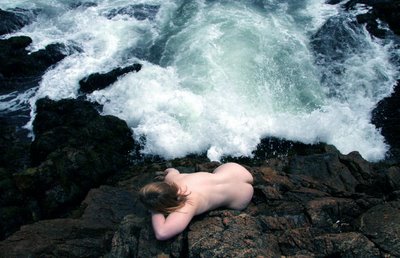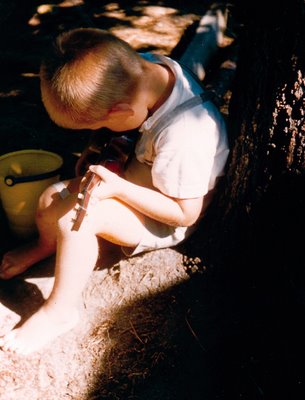Message in a Bucket

Many creature pursue their own lives and destinies without any wish to hold communion with mankind, anxious only to shun human interference. This is not so with the faeries. However happily they may seem to pass their days in feasting and riding and the delights of music, however much they resent human spying or human interference, they are never thought of as indifferent to men; human help is necessary to many of their activities, and they greatly desire to influence human destiny.
-- Katherine Briggs, The Fairies in Tradition and Literature
***
John is a friend and co-worker who inhabits a non-physical dimension of life. He is a being of spirit. When he first made contact with my partner, Myrtle Glines, and me in 1965, he said we could call him John, for while that was not his name it was a good a name as any for our convenience. He true name is the vibration and quality of his being, which I experience as the song of love, of promise, of joy, and of confidence in the presence of God, the Beloved.
-- David Spangler, “Conversations with John,” 1980, prophesies of a sort at the dawning of what Spangler then saw as The New Age
***
The full moon tonight has many names. One is the Full Buck Moon.
Native American folklore associates this full moon with the season in which male deer grow new antlers, whose coatings of velvety fur are as soft as moonlight. The July full moon - like any full moon - stands opposite the sun in our sky. So the moon tonight rises around sunset and sets around sunrise.
The July full moon displays characteristics at odds with the July sun. Every full moon is opposite the sun. That's what makes it a full moon. The July sun climbs high in the sky as seen from the northern hemisphere, where it's now summer. Meanwhile, the sun stays low in the southern hemisphere sky, where it's winter now.
The full moon - opposite the sun - takes a path across the sky tonight resembling the path of the sun six months ago. In other words, tonight's moon is reminiscent of the January sun. Its path across the sky is low for the northern hemisphere and high for the southern hemisphere. Tonight's moon is also the southernmost July full moon until the year 2023. In the northern hemisphere, the path of tonight's moon hovers closer to the horizon than the path of the lowest winter sun.
-- www.earthsky.org
****
The deep sea has its stars, and perhaps here and there an eerie and transparent equivalent of moonlight, for the mysterious phenomenon of luminescence is displayed by perhaps half of all the fishes that live in dimly lit or darkened waters.
... The deep sea squid ejects a spurt of fluid that becomes a luminous cloud, the counterpart of the “ink” of his shallow-water relative.
-- Rachel Carson, The Sea Around Us

DEEP-SQUID INK
July 10
In my dream I was talking
with my wife who stood
strangely at the far end
of our bedroom night,
there next to the doorway
which leads downstairs.
At first what she said was quite
normal -- the idle chatter
of a day -- but slowly that
began to fade as I realized
something was becoming
apparent from within her,
surging up with eerie
phosphor and weird,
sea-bottom clicks. I
could almost see her
smile thinning to icy
lips which parted to
reveal row after row
of welcoming saw teeth.
But the image only
flickered and then
was gone, my wife resuming
the calm demeanor of
a known figure of the dream,
though changed somehow,
blent with that intimation
of depths like a melusine
half in and out of wild water.
I sensed that a distant
creature had used
the love of my wife
and mine for her
to metaphor the meet
and greet of deeper things
than human words today
can welcome, much less
name, though an intimacy
remains, as deep perhaps as
the brainstem falls
back in the sea.
She motioned for me
to follow her downstairs
(a faint smile like a chased
maid’s giggle, a masthead’s
invitation to voyage
holding on to naked breasts
across and down the surge)
and I did, down a flight
of steps & hall & through
the kitchen & living rooms
of blackest night which
were lamped weirdly by cold
blue. In every window
I saw a yellowish full moon
at its lowest arc across
the South, that Cape it lingers
at every 18 years or so.
Wild. I tried to sleep a while
longer in the bed downstairs
but it was no use, these
words kept rising in my
mind to conscious reaches
like jelly zeppelins of
ghoulish fire. I turned
a while then gave up
sleep’s ghost, ballasting
out of bed at 3
to write these gleams of
ghastly squid-think down.
On the inside of my dream
I was led to believe that the
dark thing was no god or
foe but just the lowest totem
of my tribe, a beast up from
such primeval dark I would
surely drown in terror to behold
him full frontally: So he gouted
through my sleep a wash
of lucent phosphor
which assumed my wife’s
sweet face, the one I know
by now almost better than my
own, in a visage tranquil
as as Sunday afternoon
when we are home and
working on the things we
know and love best. Thus
I talked with him through
her, and thus trust the
downward rappels through
glacially palatial black waters
as domestic in her way: familiar
in every surface way with
abysmal miles yet to fall,
not known but trusted, safe.
St. Brendan harbored on the
whale Jasconius every
Easter for the seven years
he sailed, pitching perhaps
his surest abbey there
on an isle of brutally diving
fish. The washes of that
strange, low moon toll
from the chapel of my
lowest South, like cold
blue elven bells heard
rarely in the deepest night
and then only every 18
years or so. Some trilobite
of the Cambrian is in my
pail today, the one I
hauled up from my sleep,
the one handed up to
my dream from whatever
swims beneath it.
That’s what’s in the
pail today, the pail
I’ve sung to every
day since I put that toad
in long ago when the sea
first sang to me.
O what an ancient
arching cry I hear there,
risen up from
the moon’s own womb,
that starry seabed stone!
How proud I am to
throat it here
at this low, wild,
full-mooned, crashing
shore, with every
nerve of my blue words
straining toward
what she motioned
to at the end of
night’s down-diving
door.

According to “The Voyage of St. Brendan,” Brendan burned a book containing stories about the wonders of God’s creation out of disbelief. For this reason he is sent on a voyage so as to see with his own eyes certain divine manifestations which earlier he had refused to credit. In this way he is to recover the book by refilling it with the wonders which he witnesses on his voyage. The majority of the phenomena which he comes across are related to man’s actions and behaviour in this life and the circumstances consequent upon them in the Afterlife. Brendan encounters souls in hell, heaven and paradise. The astonishing and sometimes frightening experiences restore his belief.
— Clara Strijbosch, “The Heathen Giant in the Voyage of St. Brendan”
(School of Celtic Studies DIAS 1999, p. 369)
***
Two well-known 12th-century metaphors may be recognized in Brendan’s assignment to record the remarkable phenomena he will encounter in his journey, that of the “book of nature” and of the “book of experience.” The 12th century theologian Hugh of St. Victor has this “book of nature” in mind when he compares creation to a book, “written by God’s finger” in which each creature resembles a picture which “reveals the wisdom of God’s invisible things.” Hugh’s contemporary Bernard of Clairvaux writes in one of his sermons, “Today we read in the book of experience. Turn your mind inwards, and let each one of you consult his own conscience about what should be said.” By considering the restoration of the book at the culmination of a journey through creation, the Voyage provides a narrative interpretation of both metaphors.
- Clara Strijbosch, The Seafaring Saint: Sources and Analogues of the Twelfth Century Voyage of St. Brendan
THREE BOOKS, ONE TALE
July 8
My tale involves three
books so far, though
they may bind a distant
fourth. The first book
is the one I was writ
down into as so much
spilled ink, random squids
of history trolled from
the crash of my father
on my mother, that violence
and foam where desire
and its montrosities
trolled up an ancient,
mistral sound.
I threw that book into a
sea of fire I whipped up
with a blue guitar, the
one I found half in a woman’s
wake and half what there
choired when I failed to haul
her back. I wrote
loud lines of sperm-thick
ink across a ghostly
naked page to no avail,
that ligature of God
writ wrong, discordant,
too-loud, my power
chords no less in smash
than my parents loins
had mashed the volume
which is me. That book
pyred down into this
diving third where
I retrieve the first
book, page by page,
from the mouth
of its devouring whale,
recording here
a basso organum
which translated
one tale into the
gyring whale which
hauls God’s deepest
bliss from deep to
deeper shores.
History pickled in
mystery, delved back
here a strangely
sweeter song, the
inside rapture of
what I never found
between a woman’s
glissading sighs.
How long this book
must go on before
its fully writ is
not for me to say:
As long as sanctus
stirs this hour I’ll
mount this pen
and ride the waves
of salt deep blue,
following a trail
of moonsteps
toward shores
far west enough
to amen this book
and shut its covers
fast and toss it
to a third sea
whose depth and
tincture I can’t see
or sound, much
less name. Not yet.
Today I fill another
page of Your blue
book of depths
as the rest of
life wounds by.
Praise to the angel
who spirits this pen
and mans the oars
of today’s blue tune,
between wave-spray
and whalish spume.

By 1854, when Maury collected all available records, only 180 deep soundings were available from the Atlantic, and by the time that modern echo sounding was developed, the total that had been taken from all the ocean basins of the world was only about 15,000. Thais is roughly one sounding for an area of 6000 square miles.
Now, hundreds of vehicles are equipped with sonic sounding instruments that trace a continuous profile of the bottom beneath the moving ship (although only a few can obtain profiles of depths greater than 2000 fathoms) ((when this book was written in ‘53)). Soundings are accumulating much faster than they can be plotted on the charts. Little by little, like the details of a huge map being filled in by an artist, the hidden contours of the ocean are emerging. But even with this recent progress, it will be years before an accurate and detailed relief map of the ocean basins can be constructed.
-- Rachel Carson, The Sea Around Us

SOUNDING A FACE
July 9
Here I map the
heart’s deepest terrain,
sorting and sifting
the piled remains
which fell to form
its coasts. Or I am
a phrenologist of
that patient face
couched on sea beds
staring back from
its abysm -- slow
work indeed,
with six thousand
square miles of deepest
feeling to sortie
with seven by nine inch
thimbles of paper,
retrieve a drop
of squid ink at a time.
Such tiny buckets
must pour ten thousand
times before just
a brow shapes in
the murk, as
many to sense
something deeper,
the glint of blue
inside the darkest
hue pupilled there.
No none on the shores
I left behind has bid
me to this task;
and, as far as
I can tell, no one
on later shores awaits
the logs and charts
I ferry: But fame and
fortune are for that
deep world’s losers,
high ground too dry
and light-soaked
for seal and Sidhe-folk.
You have to fall and
fall only as you can
from days, stumbling to
this writing chair in
a predawn scriptorium
lamped by the night’s
great bowels, thick
as brine and wide-eyed
to the forms no eye
can see except from
inside, from under.
I blunder and blubber
down an oubliette
of backassed sense,
spooring rhyme and
brogue-thick metaphors
of seas awash with heart,
the sea beneath the sea
which tides its depths
through me. My lusts
and nightmares whirl by
like phosphors galloping
through the parted thighs
of Sleepy Hallow; horrors
too, echoes of cracking
keels and roaring billows
and the farewells to wives
and prayers of sailors who
spiralled down into
the silencing tomb of
God. My sounding-line
is as wide as a breath
and falls from my head
to balls to soles, to
graze my father’s noggin,
descending down
the well of his life
into the skull of his
dead father; and so on,
down the generations
like a totem-pole
where each face is
a face carved the way
a heart is pierced
and ravished, each
face a vertebrae
of the whale which dives
down all the way
to doom’s prehistory,
that low, sea-braiding
song. That where
Manannan’s court is found
with this book complete
and bound with gold
covers studded with
emeralds and rubies
and lapis lazool.
My work is his,
you know: He bids
me peer below
beneath the visible
and known into
regions vast as sleep
with vaults piled high
with the wings of
every angel to dive
from heaven’s keep
in search of human
measure, the true
treasure I account.
Well, perhaps. That’s
just today’s sounding,
one measure taken
from the millions
that’s required to
name just what
this is all about.
It’s a task which
I’ll never get to in
the fullest breadth
of darkest depths.
Besides, the face
I’m raising may prove
useless in the end,
its voice too strange,
those eyes too foreign
to a future that burns
its past like books.
Well, when Brendan
burned the book of
wonders it was
God who bid him
sail its marges with
a darker pen in hand;
perhaps my book
thus is best in
flames, that its
blue cinders give
the true heart
a proper look
far under
fact or art.


<< Home